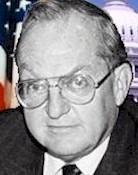
Coble (R-NC)
Subcommittee Approves Patent Bills
May 22, 2001. The House Judiciary Committee's Subcommittee on Courts, the Internet and Intellectual Property adopted two bills pertaining to patent reexaminations, HR 1866 and HR 1886, by unanimous voice votes after a brief discussion. HR 1866 is intended to overturn the opinion of the U.S. Court of Appeals (FedCir) in In Re Portola Packaging. HR 1886 affords all participants, including third party requesters, in reexamination proceedings judicial review before federal appeals courts. Rep. Howard Berman (D-CA) also used the occasion to suggest other changes to patent law that he would like the subcommittee to consider at some later date. See, excerpts from the hearing.
 |
|
| Rep. Howard Coble (R-NC) |
Rep. Coble stated that "the 1997 In Re Portola Packaging case ... has been widely criticized as undermining the goals of Congress when it passed the 1980 reexamination statute. Further, the case is criticized for having established an illogical and overly strict bar concerning the scope of reexamination requests. The bill that is under consideration preserves the substantial question standard, which I like to call the speed bump. We kept the speed bump intact. That is an important safeguard to protecting vendors against frivolous action, while allowing the process to continue as originally intended. I believe that by adding this one sentence to the Patent Act, we will help prevent the misuse of defective patents, especially those concerning business methods." The one sentence added by HR 1866 is as follows: "The existence of a substantial new question of patentability is not precluded by the fact that a patent or printed publication was previously cited by or to the Office."
Rep. Berman added that the Portola cased "narrowly construed the term "substantial new question of patentability" to mean prior art that was not before the examiner during an earlier examination. Because the PTO Director can only order a reexamination if a substantial new question of patentability exists, the Federal Circuit's decision effectively bars the PTO from conducting a reexamination based on prior art that was cited in the patent application. The Portola decision is troublesome because it prevents reexaminations from correcting mistakes made examiners. Ideally, a reaxamination should be requested based on prior art cited by an applicant that the examiner failed to adequately consider."
 |
|
| Rep. Howard Berman (D-CA) |
Rep. Berman also discussed other patent issues. "I think you start us
down the road, and I emphasize, START, down the road, of making reexamination a
far more attractive and effective option for challenging a patent's validity. I
look forward to working with you on additional legislation to further the
improve the robustness and effectiveness of post grant challenges. In
particular, Mr. Chairman, I hope we can expand post grant challenges to address
the full range of novelty, non-obviousness, and specificity requirements for
patentability. I believe post grant challenges should have less draconian
estoppel provisions than those applied currently to inter partes reexamination.
We should look to the burden of proof, as it applies in post grant challenges,
as well as the adjudicator's discretion to gather additional evidence. I also
hope that we can work out some mutually acceptable legislation to increase the
strength of patents that are issued by improving the examination process, for
example, by improving the prior art available to examiners. Preventing bad
patents from issuing is just as important as curing defects in issued patents.
..."